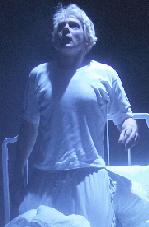SITE GUIDE
SEARCH
REVIEWS
FEATURES
NEWS
Etcetera and
Short Term Listings
LISTINGS
Broadway
Off-Broadway
NYC Restaurants
BOOKS and CDs
OTHER PLACES
Berkshires
London
California
New Jersey
DC
Philadelphia
Elsewhere
QUOTES
TKTS
PLAYWRIGHTS' ALBUMS
LETTERS TO EDITOR
FILM
LINKS
MISCELLANEOUS
Free Updates
Masthead
Writing for Us
A CurtainUp  London Review
London Review
 London Review
London ReviewAngels in America
|
It's 1986 and there's a plague. Half my friends are dead and I'm only thirty.
---- Prior |

Mark Emerson as Prior Walter
(Photo: Manuel Harlan) |
Tony Kushner explores what was a silenced side of American life in the 1980s: the horrifically swift rise of Aids which was largely ignored by Reagan's political regime and mainstream media. In spite of its zeitgeist particularity, Angels is still relevant and moving today: both as Aids continues to ravage the human race, but also as a poignant and meaningful character drama exploring humanity and suffering
Spanning centuries, celestial spheres and a vast array of characters (real and fictional, historical and modern), the play focuses on two struggling relationships. The first is a gay couple, Prior (Mark Emerson) and Louis (Adam Levy), whose relationship is fractured by Prior's HIV infection. While Louis absconds in the face of pain, Prior suffers from illness, loneliness, prophetic visions and apparently divine visitations. The second is a Mormon couple straight from Salt Lake City, Joe (Jo Stone-Fewings) and Harper (Kirsty Bushell). Their marriage is marred by Harper's grip on reality, critically damaged by a husband whose sexuality is denied by his religious beliefs.
Daniel Kramer's direction and Soutra Gilmour's set design create a distinct atmosphere of New York in the 1980s. A chaotic, overcrowded stage with overlapping scenes and often garish colours all add to the sense that this is a city crammed full of people. When the characters open a door on the backdrop, they let in the deafening noise of a relentlessly busy road. There also a sense of illness and decay at the heart of this hectic humanity. Just as the characters with HIV develop lesions, so the beds are thinly disguised hospital beds and even heaven is full of invalid angels.
The star of this marathon classic is without doubt Mark Emerson. Sick, abandoned and possibly insane, Prior is hardly an easy part to play well. The role requires much desperation and ranting, but Emerson never for a second sacrifices the audience's sympathy. Kirsty Bushell as Harper is similarly affecting, even when her fantastical hallucinations are acted out on stage. The unloved wife of a suppressed homosexual, her nascent paranoia and "emotional issues" escalate into delusional episodes. At one point, the stage is transformed into Antarctica for her because, as she tells us, it is "deep freeze for feelings. You can be numb and safe here."
In another plot strand Greg Hicks plays the infamous corrupt lawyer Roy Cohn. He is a frenetic quick-talker, scarily influential, manipulative and, as you would imagine, deeply dislikeable. Hicks' vigorous performance reveals how Roy's fiercely litigious philosophy ("Hire a lawyer. Sue somebody. It's good for the soul") is more swagger and personal power rather than any sense of justice. As he dies of Aids, he gains his own private ghost: Ethel Rosenberg (Ann Mitchell) — the woman condemned to death due to his own illegal interference. Kushner's script cleverly shifts emphasis away from the dying Roy (and his potential deliverance or demonisation) and instead focuses on Ethel's capacity for forgiveness and her own redemption from bilious anger.
Other actors in this compelling cast include Golda Rosheuvel as the ambiguous angel who haunts Prior and who is more terrifying than beneficent and whose powerfully resonant voice is put to good use. Obi Abili plays Belize, the very camp nurse who wears daringly effeminate outfits but is actually the most down to earth and practical character.
This is a great production of a fantastic, important play. Its overarching themes are admirably underpinned by individual, naturalistic and poignant human stories. A play which possesses such a sense of wit and humanity in the face of suffering will always be significant and welcome, regardless of the production's nation and era. As the character Harper suggests, "Life is full of a kind of painful progress — longing for what we've left behind and dreaming of the future."
|
ANGELS IN AMERICA
Written by Tony Kushner Directed by Daniel Kramer Starring: Mark Emerson, Greg Hicks, Adam Levy, AnnMitchell, Kirsty Bushell, Golda Rusheuvel, Obi Abili, Jo Stone-Fewings Set Design: Soutra Gilmour Costume Design: Mark Bouman Lighting: Charles Balfour Sound: Carolyn Downing A joint production between Headlong Theatre, Lyric Theatre Hammersmith and the Citizens' Theatre Glasgow Running time: Part 1 Three hours 40 minutes with two intervals, Part Two Three hours 45 minutes with one interval Box Office: 0870 050 0511 Booking to 22nd July 2007 Reviewed by Charlotte Loveridge based on 26th June 2007 performance at Lyric Theatre Hammersmith, King Street, London W6 (Tube: Hammersmith) |
|
London Theatre Tickets Lion King Tickets Billy Elliot Tickets Mary Poppins Tickets Mamma Mia Tickets We Will Rock You Tickets Theatre Tickets |




